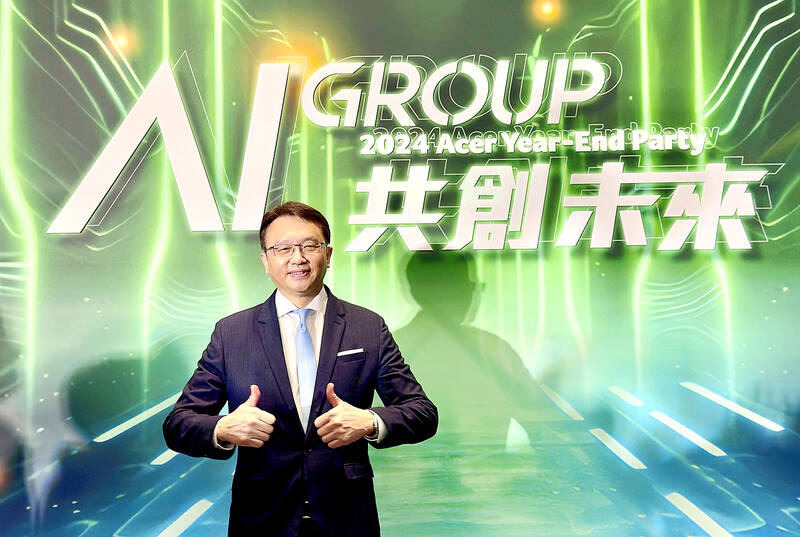PC brand Acer Inc (宏碁) plans to raise the price of products made in China and sold to the US by 10 percent in response to US President Donald Trump hiking tariffs on imports from China.
Acer said on Monday that the planned 10 percent will be a default price increase based on Trump’s tariff hike, confirming a report in the Daily Telegraph over the weekend citing chairman Jason Chen (陳俊聖).
In the Daily Telegraph report, Chen said products shipped before the 10 percent tariff took effect on Feb. 4 will not be affected so the price hike will take place in the coming weeks.

Photo: Fang Wei-chieh, Taipei Times
“We will have to adjust the end user price to reflect the tariff,” Chen said in the report. “We think 10 percent will be the default price increase because of the import tax. It’s very straightforward.”
The report said Acer’s most expensive laptops cost up to US$3,700 in the US market, so the price hike is expected to increase the price American consumers have to pay by hundreds of dollars.
According to market information advisory firm Gartner Inc, Acer was the fifth-largest PC vendor in the US market in the fourth quarter of last year with a 5.8 percent share, trailing US-based HP Inc with 26.1 percent, Dell Inc with 21.8 percent, China’s Lenovo Group Ltd (聯想) with 17.2 percent and Apple Inc with 14.9 percent.
Asustek Computer Inc (華碩), another Taiwanese PC vendor, took the sixth spot with a 5.2 percent share of the US market in the fourth quarter, Gartner said.
The Daily Telegraph said almost 80 percent of notebook computers shipped to the US market are made in China.
Chen also told the Daily Telegraph that Acer is considering the possibility of different supply chains outside China, and production in the US market is one of the options.
The report echoed remarks made by Chen when he spoke with Taiwanese news media on Feb. 3 that amid Trump’s tariff actions, a PC brand, like Acer, has to choose a supply chain that benefits the company most by taking into consideration a range of factors, including production costs and logistics expenses, to make the most favorable choice.

South Korea’s equity benchmark yesterday crossed a new milestone just a month after surpassing the once-unthinkable 5,000 mark as surging global memory demand powers the country’s biggest chipmakers. The KOSPI advanced as much as 2.6 percent to a record 6,123, with Samsung Electronics Co and SK Hynix Inc each gaining more than 2 percent. With the benchmark now up 45 percent this year, South Korea’s stock market capitalization has also moved past France’s, following last month’s overtaking of Germany’s. Long overlooked by foreign funds, despite being undervalued, South Korean stocks have now emerged as clear winners in the global market. The so-called “artificial intelligence

NEW IDENTITY: Known for its software, India has expanded into hardware, with its semiconductor industry growing from US$38bn in 2023 to US$45bn to US$50bn India on Saturday inaugurated its first semiconductor assembly and test facility, a milestone in the government’s push to reduce dependence on foreign chipmakers and stake a claim in a sector dominated by China. Indian Prime Minister Narendra Modi opened US firm Micron Technology Inc’s semiconductor assembly, test and packaging unit in his home state of Gujarat, hailing the “dawn of a new era” for India’s technology ambitions. “When young Indians look back in the future, they will see this decade as the turning point in our tech future,” Modi told the event, which was broadcast on his YouTube channel. The plant would convert

‘SEISMIC SHIFT’: The researcher forecast there would be about 1.1 billion mobile shipments this year, down from 1.26 billion the prior year and erasing years of gains The global smartphone market is expected to contract 12.9 percent this year due to the unprecedented memorychip shortage, marking “a crisis like no other,” researcher International Data Corp (IDC) said. The new forecast, a dramatic revision down from earlier estimates, gives the latest accounting of the ongoing memory crunch that is affecting every corner of the electronics industry. The demand for advanced memory to power artificial intelligence (AI) tasks has drained global supply until well into next year and jeopardizes the business model of many smartphone makers. IDC forecast about 1.1 billion mobile shipments this year, down from 1.26 billion the prior

People stand in a Pokemon store in Tokyo on Thursday. One of the world highest-grossing franchises is celebrated its 30th anniversary yesterday.